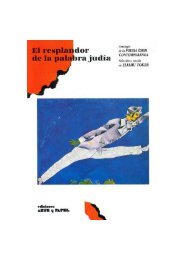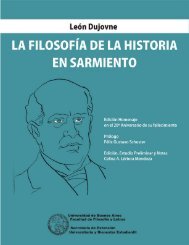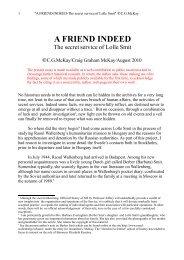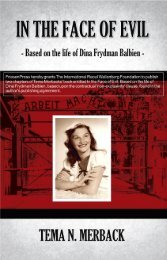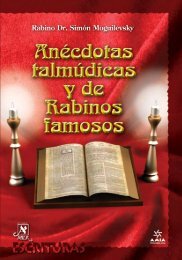We were There - The International Raoul Wallenberg Foundation
We were There - The International Raoul Wallenberg Foundation
We were There - The International Raoul Wallenberg Foundation
Create successful ePaper yourself
Turn your PDF publications into a flip-book with our unique Google optimized e-Paper software.
Count <strong>Wallenberg</strong>, and rushed over to the temporary headquarters of the Swedish Delegation. This<br />
amounted to near suicide, but he put his trust partly in that scrap of paper signed by <strong>Wallenberg</strong> and<br />
partly in the hope that the Arrow Cross men would be busy supervising the file of marchers. And so it was<br />
- he reached the delegation without being apprehended. At the office he was reassured that <strong>Wallenberg</strong><br />
had already acted and stopped the further evacuation of any Swedish houses. He could not halt those<br />
already evacuated, and four houses <strong>were</strong> taken to the ghetto that morning. Had we stayed in the<br />
originally allotted flat we would have ended up in the ghetto as well.<br />
That day Father got home safe and sound, but this was not the fate of "little Perl", our regular liaison<br />
officer. He was one of the bravest men we ever knew. Maybe in his late twenties or early thirties, he was<br />
a meek, soft spoken, slightly flabby young fellow. Little Perl commuted indefatigably between the Swedish<br />
delegation and the protected buildings. He brought messages, he took messages, he arranged for the<br />
desperately sick to be transported to the makeshift hospital, and he arranged for the daily food to be<br />
delivered. But the day came when he failed to turn up. He disappeared without trace. <strong>We</strong> never found out<br />
what happened to him.<br />
After the 6th of January we breathed a little easier. It was clear that <strong>Wallenberg</strong> had some power over the<br />
brigands. What conferred power on him remains a mystery to this day. Was it his personal courage, his<br />
determination, or his charisma that stopped the murderers?<br />
With the increase of the intensity of the siege many people moved down into the cellar, but we stuck it<br />
out in our flat. It became bitterly cold; snow was lying in the courtyard and on the streets. Our stock of<br />
water in the bath turned into ice. <strong><strong>The</strong>re</strong> was no more wood to burn in the big tiled stoves, and we gave up<br />
the idea of heat. By then there was a German army supply corps stationed outside on the street, and we<br />
watched the soldiers scuttling around. <strong>The</strong>y did not seem to be in a much better position than we <strong>were</strong>.<br />
One of the soldiers knocked on the entrance door of the building and asked for asylum. This was readily<br />
granted. Both sides <strong>were</strong> happy with the arrangement reached with Herr Lembke. He secured<br />
accommodation for himself a little warmer than the street corner, and the meager food provided by the<br />
Swedes was better than his rations. He probably hoped that the Russians would not take him as a POW.<br />
<strong>We</strong> on the other hand <strong>were</strong> happy to have an official guard person. Herr Lembke escorted our foraging<br />
parties on the street. When our water supply failed completely, other, more fortunate houses still had a<br />
trickle coming from a tap in their cellars. Herr Lembke, with his rifle on his shoulders, pretending to escort<br />
prisoners, accompanied the water carriers with their buckets.<br />
By the morning of the 16 th of January, all the Germans outside our building <strong>were</strong> gone! This was strange<br />
indeed, and even stranger was the behavior of the character behind the huge piece of furniture on the<br />
balcony of the house opposite. He would intermittently emerge from behind the wardrobe and fire a gun.<br />
But he did not fire in the direction the Russians <strong>were</strong> coming from - he fired in the direction the Germans<br />
<strong>were</strong> leaving.<br />
<strong>The</strong> whole building was in turmoil: the Russians are here! Eventually a Russian soldier walked in. No<br />
ordinary soldier was he but a character from an opera, maybe the Khovanschina. On his head was the<br />
regulation Russian army fur cap with the ear flaps, he had a brilliant white fur coat, and in his hand he<br />
carried a sword. Shining riding boots completed his attire. He was invited into the office and people<br />
flocked to admire him, to thank him, even to kiss his hands. <strong>We</strong> made him understand that we <strong>were</strong><br />
Jewish, that our lives had been in danger and that we <strong>were</strong> grateful to him for liberating us. <strong>The</strong> soldier<br />
made a gesture with his sword, indicating that in his eyes all people <strong>were</strong> equal and that henceforth we<br />
<strong>were</strong> free.<br />
This is how I remember that day, January the 16th. Did I dream the soldier?<br />
9







